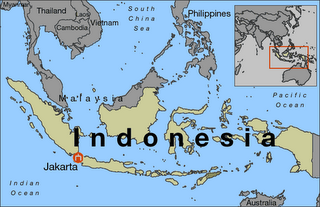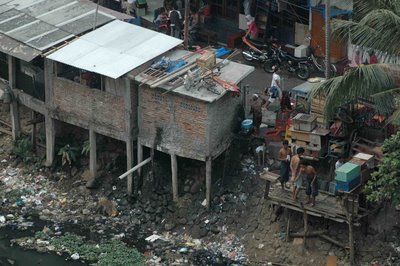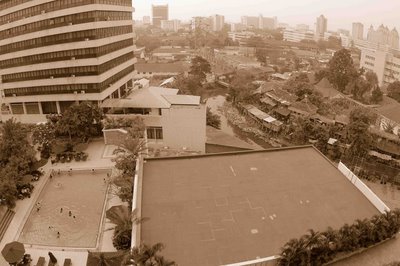
Jakarta, Indonesia
On the way to Jakarta, during my sixty-hour journey that stretched from Friday morning through Sunday evening, I began to think about some of the larger issues that I will confront while in Indonesia. From transmigration to the role of the navy in ameliorating Sino-American aggression, there are dozens of potential research projects to keep me busy in Java. Foremost though, I want to look at why and how Indonesia can “keep it together” – relatively speaking – while much of the rest of the Muslim world explodes in sectarian strife, religion-fueled hatred, and disregard for humanitarian and civil norms. Even this past week, troop draw-downs in Timor Leste (the side of Timor still beholden to Jakarta) signified an increased Indonesian alacrity and ability to promote peace. Simultaneously, we have witnessed arguably the worst escalation of violence in the Arab-Israeli conflict in forty years, while hundreds of Iraqi citizens die in sectarian fueled car bombs each week.
We are not witnessing what Condoleezza Rice last week called the “birth pangs of a new Middle East.” Instead, we are all observers of centuries-old strife that has been exacerbated and fueled by more oil, better communication technology, and an increased ability to kill and destroy. We are witnessing, in short, a reign of stagnation. Nations, the global market place, and civilization more broadly are all failing in their much-needed role of brokering peace and holding otherwise rampant hostilities in check. The reign of stagnation that is taking hold across the Middle East garners more support everyday, and we – the Western we – can’t figure out how to diminish its hold.
As I have adopted a more realist perspective – in the international relations sense of the term – I have come to the conclusion that without proper leadership and understanding, the world system inherently trends towards an environment of nasty and brutish anarchy. The forces that prevent Europe, the U.S., and most of Asia from tearing one another apart are not present in the Middle East and the large majority of African states. As many wiser people have noted, colonial-era boundaries and demarcations that were established from wood-paneled offices in London, Paris, and Brussels transected ancient tribal boundaries, allying traditional enemies and separating long-time friends in a sprawl of armchair artifice.
So then why has Asia succeeded where Africa and the Middle East have failed? Why can’t primordial, tribal passions be channeled into more productive and modern avenues, as they are in Asia? Indonesia is a sprawling archipelago of 17,000 islands and 500 languages spread over a smattering of the South Pacific the size of the U.S. Yet, with the exception of eastern New Guinea, known as Irian Jaya, Indonesia has succeeded in its efforts to peacefully democratize. Aceh Province, embroiled in civil war until the 2004 tsunami, recently made permanent its Memorandum of Understanding. And East Timor, where the capital city was razed and thousands massacred in 1999, is now an independent, viable state.
My main avenue of inquiry for the next few months then is: Do increases in education and individual empowerment solve the problem? And if so, how do those models work, and how can they be exported to Africa and the Middle East? I plan to look at microfinance as a tool of empowerment and education, and will elaborate on the recent trend/phenomenon in a later entry.
With its galvanizing role across the Muslim world, Hezbullah has succeeded in paralyzing the Middle East peace process and the “democratization” of much of the region. As Thomas Friedman wrote in Friday’s New York Times, “When will the Arab-Muslim world stop getting its ‘pride’ from fighting Israel and start getting it from constructing a society that others would envy, an economy others would respect, and inventions and medical breakthroughs from which others would benefit?”
I would not go so far as to fully blame Muslims for the lack of development in Africa and the Middle East, but there are obvious reasons why fundamental Islam has contributed to stagnation in those regions. In a videotaped speech by Ayman al-Zawahri – Al Qaeda’s number two man – that was broadcast by Al Jazeera, he addresses his base. “My Muslim nation, without a doubt it is clear to you now that the governments of the Arabic and Islamic countries are inefficient and conniving, the organizations are paralyzed and defeated, and you are all alone in the field. So proceed with the help of God and depend only on him.”
I feel provoked and frustrated by claims like the one above that advocate a global system based on the persecution of free thought. Must a fundamentalist approach to life necessarily translate into hatred of secular people and their views? Based on Radical Islamist yearnings for global dominance, I’d wager Yes. I imagine that through mature diplomatic efforts, liberal economics could be reconciled with more moderate pan-Islamic desires. The international system that the West has devised since World War Two is certainly flawed, primarily in its propagation of disparities and the divisive symptoms of wealth accumulation. And religion could certainly help stem some of globalization’s more nasty side effects. Yet, the system has also made possible wide-ranging increases in the standard of living that were unimaginable even half a century ago. Whether or not quality of life has increased proportionally is a separate issue, but equally important to qualifying a “new world order.”
But I digress.
While for the vast majority of Americans the reign of stagnation is still just an issue facing “those people over there,” I am now one of those people – well, sort of. Indonesia is one of the world’s largest democracies. It also just happens to be eighty percent Muslim and an impressive success story. I’m hoping to learn, on a very grassroots level, why it works. At this juncture, I would imagine that fundamentally, education and the empowerment it provides are the main determinants of willingness to embrace modernity and its amenities. If we don’t learn how to assuage the reign of stagnation soon, we will be fighting it from our backyards before we know it. Some might argue that we already are.





